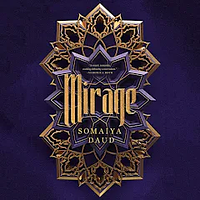Take a photo of a barcode or cover
Amani is very interesting. She has the side that is used to being commanded and controlled by the empire, yet she comes to find her own fire and struggles to differentiate it from her and Maram, the cold hearted princess she is meant to act as a double for. Nothing in Amani's life is simple, but she does her best to balance every side she finds herself on.
Maram is complicated for me. It's so easy to dislike her, but like Amani I slowly came to understand her and hope for a redemption arc in her future. Idris is as romantic as they come, though I did think his relationship with Amani moved a little too fast. Still, they had some tender moments and the kind of love you would find in a fairytale.
The world is rich in lore and really blends into its mix of sci fi and fantasy. It has legends and creatures and a complex history. It blended well with the slower pace, since most of this book focused on political drama, characters and the romance.
I recommend this book to anyone looking for a beautifully written, romantic, politically charged, sci fi fantasy tale.
I think maybe this book could have been better if the world (or galaxy) building had been a bit more expansive...or if the space part had been left out entirely. For most of the book I forgot about it taking place on a moon or a planet. It felt like it was simply two countries bordering each other. Honestly a lot of the story felt a bit oversimplified for me. I liked this book, and it read pretty quickly, so I enjoyed my time with it, but I just wanted more from it. I'l still probably pick up the sequel, because I can see the potential for this story. The execution was simply a bit lacking for me.
Hmm. (There was a lot of 'humming in response' in this book.) I enjoyed this book, but I think the hype made me expect something otherworldly. It's definitely more of a character-driven book, with amazing world-building, but...the plot pacing is rather languid. I closed the book with the feeling that nothing had really happened aside from the last 30ish pages. However, knowing that it's a trilogy helps. It's not a long book, and I hope that Daud intended Mirage to firmly consolidate our connection with Amani, Maram and Idris so that the plot can really take off in the sequels.
I also really liked the feminism gilding these pages. Amani is an incredibly strong young woman who takes a terrible situation, in which her freedom is essentially removed, and somehow finds her way back to retrieving not only her own agency, but tries to return some of Maram's to her as well.
This was not a half-life, I thought... All choices had been taken from us, and still we'd found a way to forge paths independent of what our masters wanted.In most cases, the writing is gorgeous, so beautiful, so emotive, so powerful.Our souls will return home, we will return. We will set our feet in the rose of the citadel.I closed my eyes, seeing the imagined citadel, no doubt now turned to dust. I could imagine the pain of the writer, could feel it like a bruise on my heart as my soul looked over its shoulder, leaving something treasured behind. I knew what it was like to trace a quickly fading memory in my mind, to watch it fade with every remembering until it was nothing but a feeling, a well-worn groove you could walk but not recall. The pain on the page was palpable - everyone had a citadel. The city of their birth, turned to rubble, family long gone, buried in an unmarked grave, all of it unreachable except through death.^ Like. Wtf. I nearly cried when I read that. The pain of colonialism, of implicit and explicit cultural erasure, of stark social inequality, all carried in these sprayed-purple (literally, it's a special edition) pages. But then at other times, the wording felt clunky and repetitive, and not in a poetic sort of way. There was also this one instance where I'm about 99.9% sure that Daud meant 'exasperated' when she wrote 'exacerbated'...I've been googling and googling definitions but in that sentence context I don't really see how 'exacerbated' makes sense. (Correct me if I'm wrong!)Just have to shoutout the incredibly lush world-building and attention to cultural detail! Read Em's (very awesome) review for an excellent summary of how Mirage's history of government repression echoes that of Morocco, which inspires a lot of the book's fictional Andalaan and Kushaila culture. I learned so much from looking up words and phrases Daud used, and I love that! Also, the MYTHOLOGY. I am here for the fleshed out religion of Dihya (and how it's reflected in multiple aspects of the indigenous Andalaan culture) and the Massinian poetry, and how it gives them hope. I'm religious myself, and so many sentences just spoke to me, like this one from when Amani visits a Dihyaan temple.
For the first time in months I felt something like peace settle over me. The tightness in my chest, in my muscles, unwound. When I exhaled it felt as thought a hundred small pebbles fell away. For a sliver of a moment I wasn't Maram or Amani. I was a girl in a temple, filled with nothing but want and expectation.I have never experienced half of what Amani and her fellow Andalaans have been forced to, yet it resonated so strongly to see how their faith gives them strength.For We have sent unto you a Sign. See it and take heed.I could not give up hope. I had been commanded to hold to it, to find a solution to my impossible problem. No matter what it took, no matter the cost, I could not waver and I could not give in.The romance was a bit insta-lovey, and Idris a bit too Anguished Perfect Boy™, but I didn't mind much. Cannot blame Amani AT ALL. That scene when she sings while he plays the loutar? It is every rom-com trope in one and I LOVED IT. And whenMy. Heart. Was. Dying.Spoiler
Amani reads Idris' khitaam to him?(Lmao love it when I'm reviewing a romance that I started out typing like meh it's alright and the more I review it the more invested I get, like what is this sorcery)
And when I am with you...Would that the sun never rise nor the moon set...Would that the stars remain fixed in heaven...Daud should write a book of poetry. I would 100% read it.Petition for Maram to PLEASE get either a POV or more scenes in the sequel! I absolutely loved the subtle clues dropped throughout the book hinting that Maram isn't exactly who she purports herself to be. I think I'm more invested in the tentative Amani-Maram sisterhood than the romance, tbh. Love a complex villain (or potential antiheroine?)!
Overall, I liked reading this, despite the hang-ups I had. Mirage got me emotionally invested in the beginning of this lush feminist, diverse fantasy saga and heck if I'm not going to see it through.The bones of our old ways of life were there, barely traceable, and I wanted them back. I wanted all of us to remember what we'd been, how strong we were. And endurance was strength, to be sure, but even a rock wore away to nothing if asked to endure enough rain....I am tired of being at the mercy of the world.
A book about the tyrannical colonization, occupation, and cultural genocide of a people seems especially poignant now. The themes hit hard in several places as Amani tries to navigate through the royal court of her people's oppressors, working as a body double for a cold princess. Amani's perseverance and love of her culture makes her captivating and I was surprised to get so invested in Maram despite her sometimes nefarious nature.
For the majority of the book, the plot is mostly Amani being shuffled around from palace to palace for functions, grand events, posing as Maram and figuring out more about the royal inner circle as well as the resistance towards the colonizers. It doesn't make for a very action-packed story, but the plot focuses more on the social conflicts Amani faces. It gets tense in several moments as her people face numerous threats of violence, including her family. The story at least moves well in between its most dramatic moments, even when the court appearances start to get a little tedious.
The romance felt a little too quick for me, but it was cute enough.
For a sci-fi book, there's not a lot of science fiction that goes on in the story. Other than some space travel and talks of planets there's really nothing that makes it feel very science fictiony. Scrub a few details here and there and it could have passed as a fantasy book, but I don't think that really drags it down too much.
Will definitely check out the sequel to see how things conclude.
I think I love Maram though. I basically want to read the next book just for her.





